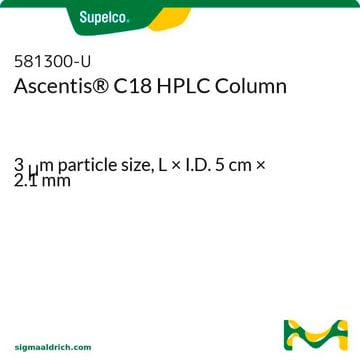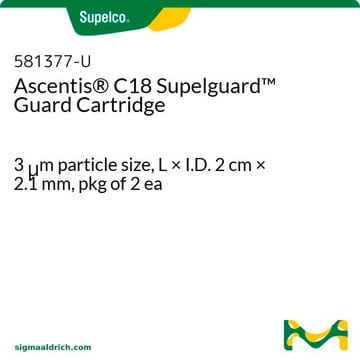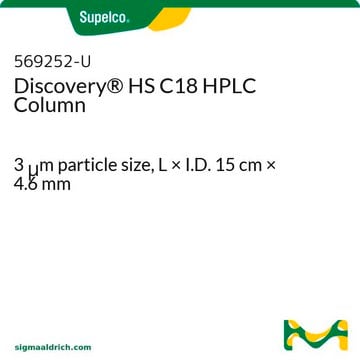581301-U
Ascentis® C18 (3 µm) HPLC Columns
L × I.D. 10 cm × 2.1 mm, HPLC Column
Synonyme(s) :
Ascentis RP18 HPLC Column
About This Item
Produits recommandés
product name
Colonne Ascentis® C18 pour HPLC, 3 μm particle size, L × I.D. 10 cm × 2.1 mm
Matériaux
stainless steel column
Niveau de qualité
Agence
suitable for USP L1 (Similar to Phenomenex Luna C18)
Gamme de produits
Ascentis®
Caractéristiques
endcapped
Fabricant/nom de marque
Ascentis®
Conditionnement
1 ea of
Ampleur du marquage
25% Carbon loading
Paramètres
≤70 °C temp. range
400 bar pressure (5801 psi)
Technique(s)
HPLC: suitable
LC/MS: suitable
L × D.I.
10 cm × 2.1 mm
Superficie
450 m2/g
Couverture de surface
3.7 μmol/m2
Impuretés
<5 ppm metals
Matrice
fully porous particle
silica gel high purity, spherical
Groupe de la matrice active
C18 (octadecyl) phase
Taille des particules
3 μm
Dimension de pores
100 Å
operating pH range
2-8
Application(s)
food and beverages
Technique de séparation
reversed phase
Vous recherchez des produits similaires ? Visite Guide de comparaison des produits
Catégories apparentées
Description générale
Application
- Identification of recombinant human insulin and biosynthetic insulin analogues by multiplexed targeted unlabeled mass spectrometry of proteotypic tryptic peptides.: This study employs the Ascentis® C18 HPLC column for the separation of proteotypic tryptic peptides, allowing the identification of human insulin and biosynthetic insulin analogues through multiplexed targeted unlabeled mass spectrometry. The method demonstrated high specificity and sensitivity, enhancing the accuracy of insulin analysis in pharmaceutical research (Qasem et al., 2019).
- Development and validation of a novel stability-indicating HPLC method for the simultaneous assay of betamethasone-17-valerate, fusidic acid, potassium sorbate, methylparaben, and propylparaben in a topical cream preparation.: Utilizing the Ascentis® C18 HPLC column, this research presents a novel stability-indicating method for the simultaneous assay of multiple compounds in a topical cream. The validated method offers robust stability assessment, critical for ensuring the quality and efficacy of pharmaceutical formulations (Byrne et al., 2014).
- HPLC-DAD and HPLC-ESI-MS/MS methods for metabolite profiling of propolis extracts.: This paper describes the use of the Ascentis® C18 HPLC column in HPLC-DAD and HPLC-ESI-MS/MS methods to profile metabolites in propolis extracts. The column′s performance in separating complex mixtures highlights its utility in natural product research and quality control (Pellati et al., 2011).
- Practical comparison of 2.7 microm fused-core silica particles and porous sub-2 microm particles for fast separations in pharmaceutical process development.: This study compares the performance of the Ascentis® C18 HPLC column with other chromatographic columns for fast separations in pharmaceutical process development. The Ascentis® column provided superior separation efficiency and speed, making it advantageous for high-throughput pharmaceutical analysis (Abrahim et al., 2010).
Caractéristiques et avantages
- Excellente rétention
- Forme symétrique du pic
- Forte reproducibilité
- Compatibilité totale LC-MS
Informations légales
Application
Colonne de garde
Code de la classe de stockage
11 - Combustible Solids
Classe de danger pour l'eau (WGK)
WGK 3
Point d'éclair (°F)
Not applicable
Point d'éclair (°C)
Not applicable
Faites votre choix parmi les versions les plus récentes :
Déjà en possession de ce produit ?
Retrouvez la documentation relative aux produits que vous avez récemment achetés dans la Bibliothèque de documents.
Chromatograms
application for SPE, application for LC-MSNotre équipe de scientifiques dispose d'une expérience dans tous les secteurs de la recherche, notamment en sciences de la vie, science des matériaux, synthèse chimique, chromatographie, analyse et dans de nombreux autres domaines..
Contacter notre Service technique







